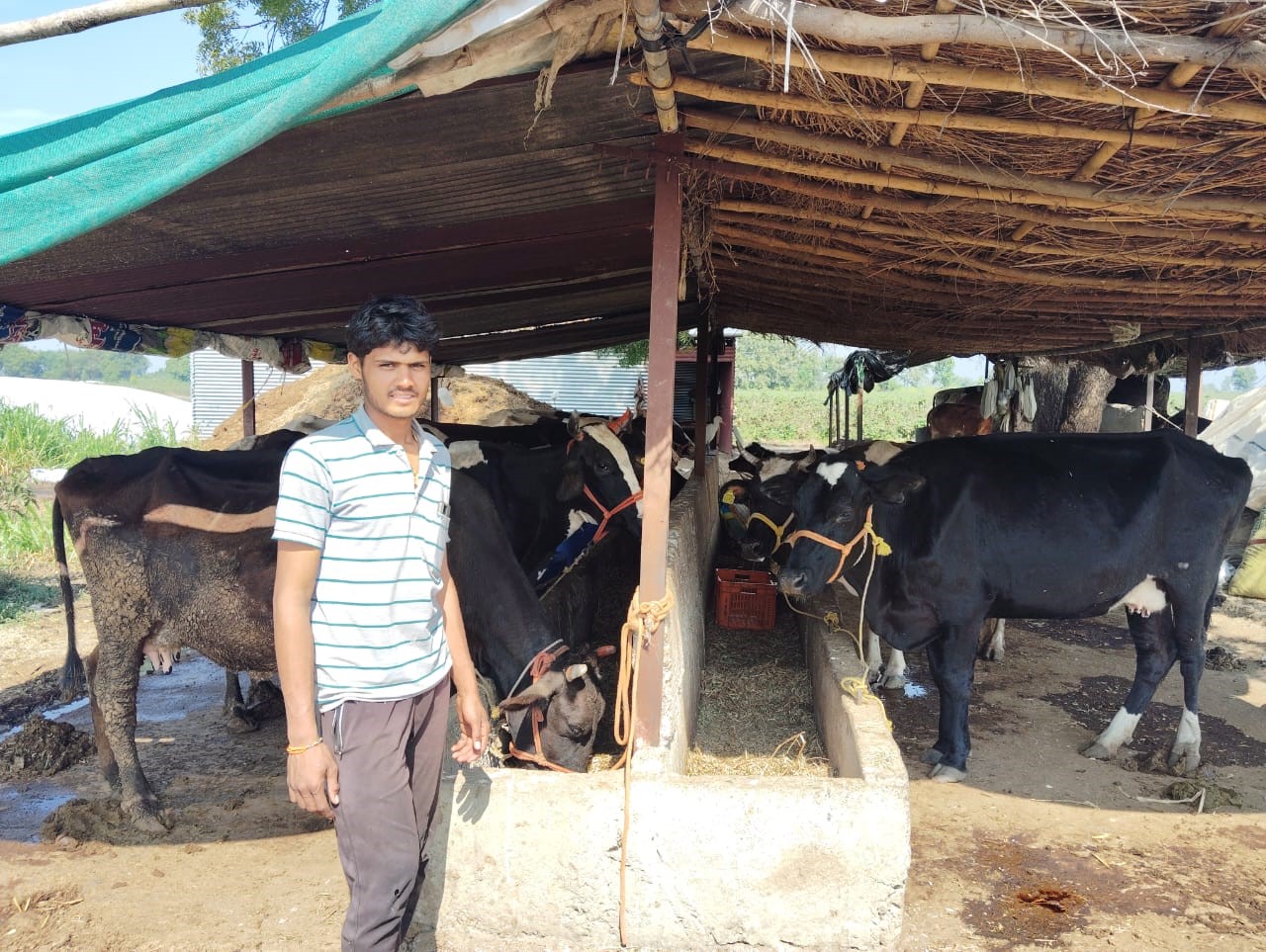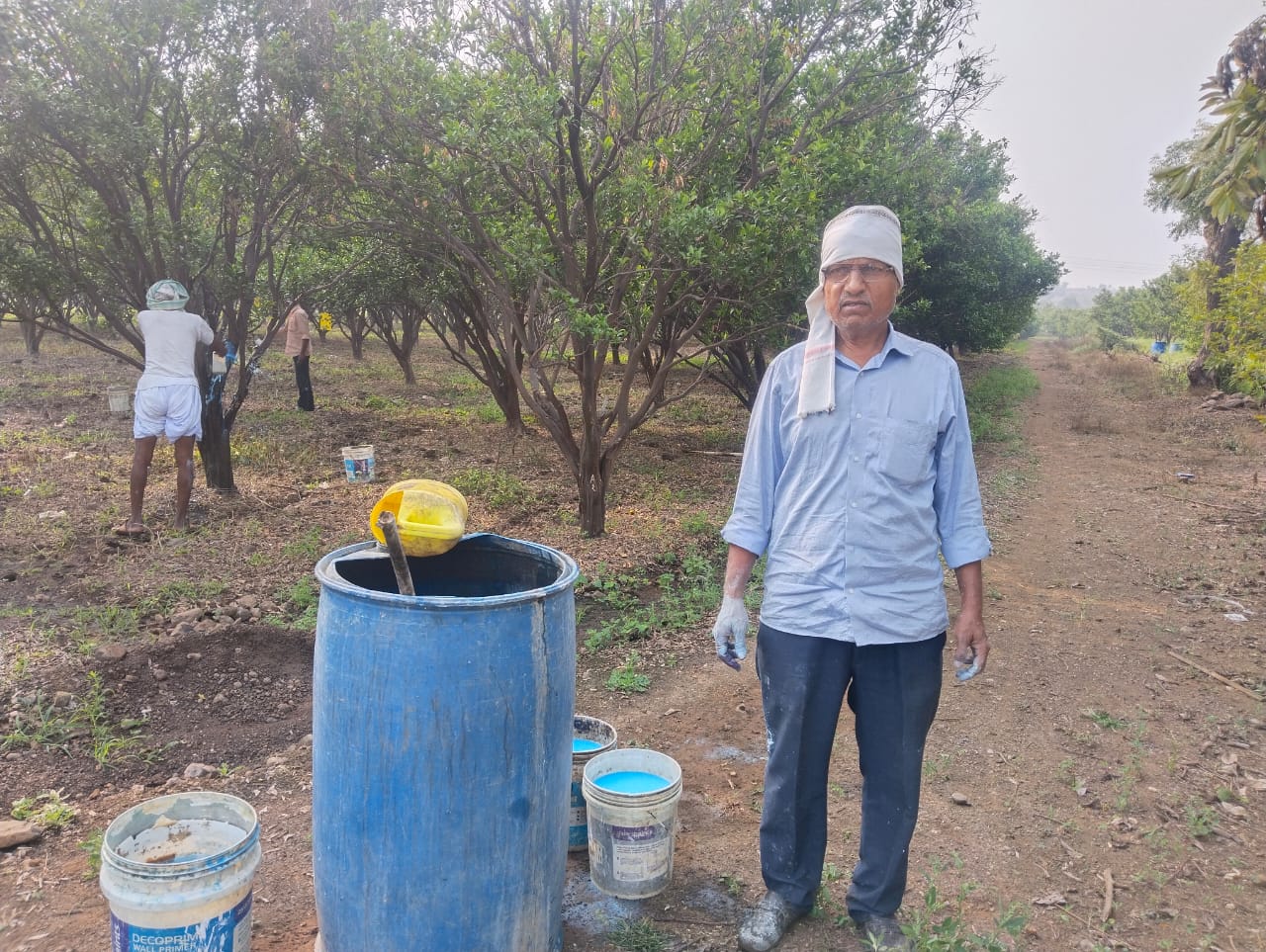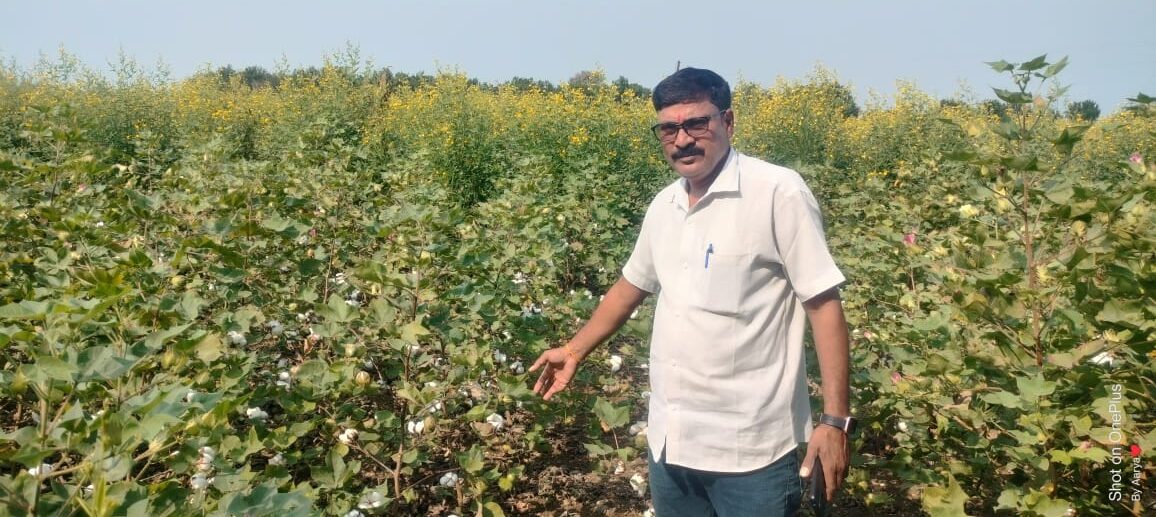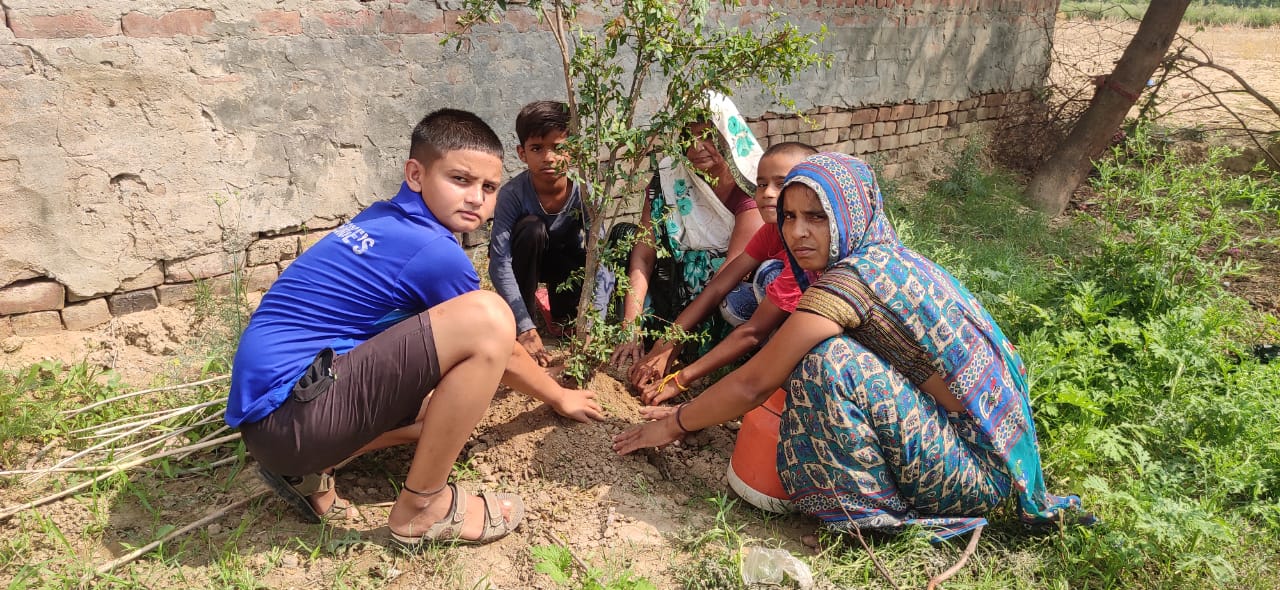While promoting health and resilience of natural ecosystems, regenerative farming is also helping cotton growers earn more and spend less
In Manegaon village in Nagpur, Maharashtra, Sudhakar Kohale’s name is synonymous with sustainable farming. Born into a family of farmers, Sudhakar (59) and his wife Pramila (50) are proud of their 6-acre land where they cultivate cotton, Bengal gram, pigeon pea and vegetables.
But not so long ago, Sudhakar was uncertain about his future as a farmer. Barely making enough from the farm to run his family of 11 members, Sudhakar looked for a supplementary source of income and decided to also work at a nearby textile mill in Kalmeshwar. In 2002, several textile mills in Maharashtra shut shop due to financial crisis, including the one where Sudharkar worked. He was back to square one.
Sudhakar and Pramila toiled on the fields but somehow the results were not showing in terms of yield. Further, the soil was turning hard and their expenses on chemical fertilizers were increasing. Sudhakar realised he had to farm in a way that would reduce his input costs and simultaneously improve his earnings.
In 2022, Sudhakar and Pramila attended a training session on vermicompost at a training and resource centre run by Solidaridad in Burujwada in Saoner block of Nagpur. The programme informed the attending farmers, including Sudhakar, about the many benefits of vermicompost and how it can be used as a natural fertilizer for the soil, as well as shared the know-how on how to make it. At the end of the session, the farmers were provided with vermi-beds. Sudhakar and Pramila received one too.
“At our training and resource centres, we organise training for farmers on use of natural crop protection products, good agricultural practices, vermicomposting etc. We also create awareness through farmer field schools and farmer corner meetings as well as weekly online farmer trainings,” says Sarfraj Diwan, District Coordinator (Nagpur), Solidaridad.
Sudhakar was using cow dung to make compost, but the quantity was too little to make any difference to his crop. Now, equipped with the vermi-bed and some guidance from the Solidaridad field team, Sudhakar decided to prepare vermicompost and used it in his farm – taking the first step towards sustainable farming (and moving away from chemical-intensive farming). Additionally, he was encouraged to use organic pest repellents like jivamrut, nimboli ark and dashparni, and reduce dependence on chemical pesticides.
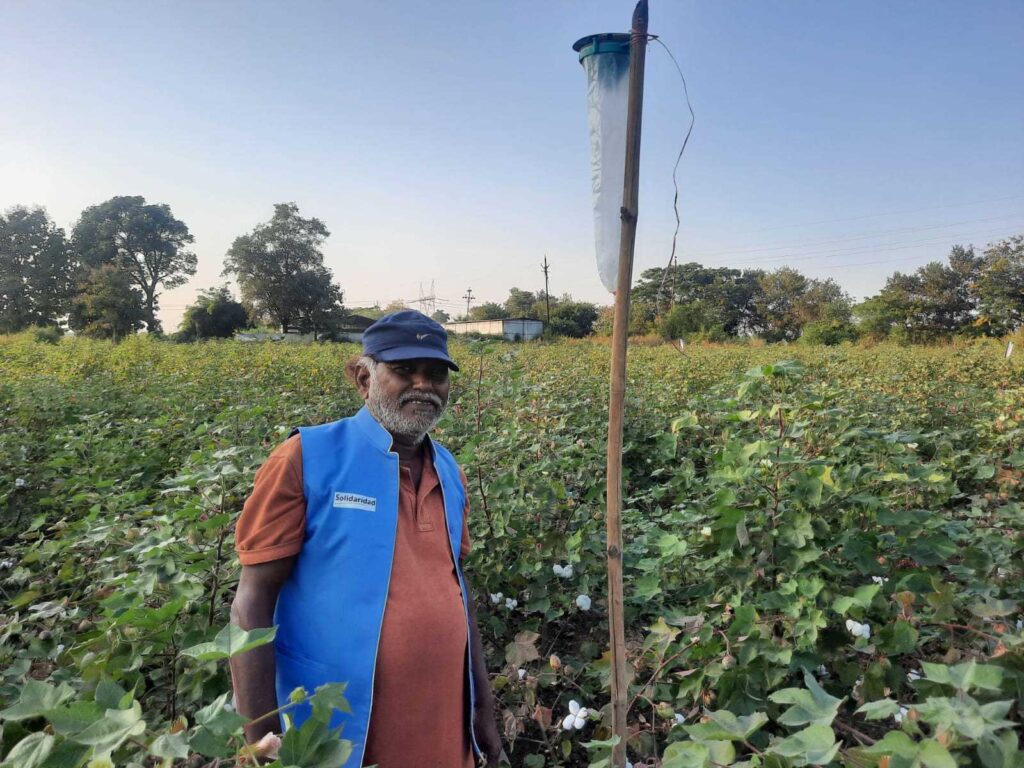
In the harvest season, Sudhakar saw the change. Against an average of 15 quintal every year, this time, he got 20 quintals of cotton from his farm, a more than 35% increase in production. His spend on chemical pesticides reduced from Rs 15,000 per year to Rs 10,000 per year.
After witnessing the results in the first year, Pramila, who had just recovered from cancer and knew the treatment cost had put a strain on the family’s savings, motivated Sudhakar to start a vermicompost unit in his farm to earn extra money. Besides cotton, he started using the vermicompost in his vegetable fields and sold the remaining compost in the local market. Since then, Sudhakar’s vermicompost unit has expanded and now consists of eight vermi-beds. Annually, Sudhakar sells 300 quintals of vermicompost and earns Rs 2 lakh.
Further, with the use of vermicompost and little to no use of chemical fertilizers over a period of time, Sudhakar saw his hard soil turning moist and its vitality revived. He is also practicing inter-cropping with vegetables, which is not only beneficial for the soil but also provides Sudhakar yet another source of income besides the cotton crop.
As a result of good agricultural practices, Sudhakar saw his income from the farm increase from Rs 2.5 lakh to Rs 3 lakh, a 20% jump. Further, the additional income from selling vermicompost has made things a bit easier for the family.
“Earlier, we did not have enough money to buy inputs for the farm or even for the family during a medical emergency, I always had to look outside for help. Now, things have changed. I can manage my finances better because of the increase in income. Agriculture is an uncertain profession; the adverse impacts of climate may lead to crop loss. Youngsters in farming must have an option of earning a supplementary income, like selling vermicompost, to be able to continue as a farmer,” says Sudhakar.
After reaping the benefits of sustainable farming, Sudhakar now wants every farmer in his village to turn over a new leaf – and to do that, he is sharing the knowledge he has acquired from Solidaridad with his fellow farmers.
The Green Route to Profit
Like Sudhakar, shifting away from chemical-intensive farming has proved to be a gainful decision for Ashatai Upasrao Musale too. A resident of Bhendala village in Saoner taluka of Nagpur, 60-year-old Ashatai is a farmer for the last 20 years and along with her husband Upasrawji Musale owns 6 acres of land, where she grows cotton, lemon and vegetables.
Her biggest worry till a few years ago was the mounting expenses on chemical fertilizers and pesticides. Every year, she was spending Rs 80,000-Rs 90,000 on these, but her cotton yield was far from satisfactory.
“We did not know about cost-effective and natural methods of dealing with pest and insect attacks, and incurred a huge cost on chemical fertilizers,” says Ashatai.
That’s when Ashatai met Solidaridad field staff through her village members. Solidaridad provided her with a vermicompost bed and a biogas digester. Ashatai was already into livestock farming – with Solidaridad’s training, she learnt to use the cow dung in the digester as well as for vermicomposting. The biogas is used by the workers on her farm to prepare their food.
Among other things, Ashatai also learnt about yellow sticky traps, an effective way to manage pests. Yellow sticky traps are installed in between the crops, which attract flying insect pests and trap them (the insects get stuck to them). The sticky traps also help in early detection of pests, giving the farmer a timely warning to manage the situation before it escalates into a big pest attack, thereby also checking extensive use of chemical pesticides.
“Earlier I was spending Rs 10,000 annually on pesticides but because of these sticky traps, I am now saving that money,” says Ashatai.
Like Sudhakar, she too was introduced to cheap but effective organic pest repellents like jivamrut, nimboli ark and dashparni. As a result of these efforts, Ashatai’s yearly spend on fertilizers and pesticides has reduced to Rs 40,000 – a more than 50% drop from Rs 90,000 (approx.) she was spending earlier. Along with that, her cotton yield has improved from 7 quintal per acre to 9 quintal per acre.
“Our programme is designed to empower farmers with knowledge and skills on sustainable and regenerative agricultural practices, which promote health and resilience of natural ecosystems. Our approach on the ground has helped farmers farm not only more profitably, but also adopt a range of holistic, regenerative practices to restore the degenerated soil, improve carbon sequestration and reduce GHG emissions in agriculture, to mitigate the impact of climate change,” says Anukool Nagi, Assistant General Manager, Solidaridad.


